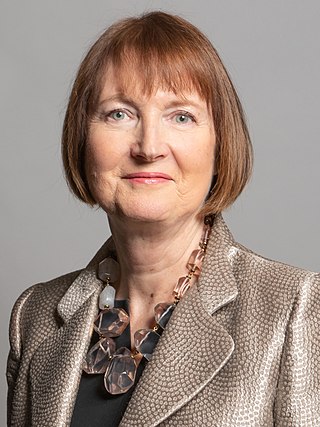
Harriet Ruth Harman is a British politician and solicitor who was a Member of Parliament (MP) for over 40 years, from 1982 to 2024, making her one of the longest-serving MPs in British history. Harman latterly was MP for Camberwell and Peckham from 1997 to 2024, and previously was MP for Peckham from 1982 to 1997. A member of the Labour Party, she served in various Cabinet and Shadow Cabinet positions. In the 2024 Dissolution Honours, she was nominated for a life peerage.

Yvette Cooper is a British politician who has served as Home Secretary since July 2024. A member of the Labour Party, Cooper has been Member of Parliament (MP) for Pontefract, Castleford and Knottingley, which has previously included Normanton, since 1997.

Maria Eagle is a British Labour Party politician who has served as Minister of State in the Ministry of Defence since 2024. She later served in the Shadow cabinets of Ed Miliband and Jeremy Corbyn. She has been Member of Parliament (MP) for Garston and Halewood, now Liverpool Garston, since 1997.

Dame Cheryl Elise Kendall Gillan was a British politician who served as Member of Parliament (MP) for Chesham and Amersham from 1992 until her death in 2021. A member of the Conservative Party, she served as Secretary of State for Wales from 2010 to 2012.

Angela Evans Smith, Baroness Smith of Basildon is a British politician and life peer serving as Lord Privy Seal and leader of the House of Lords since 2024. A member of Labour Co-op, she was Member of Parliament (MP) for Basildon from 1997 to 2010.

The Minister for Women and Equalities is a ministerial position in the United Kingdom which leads the Government Equalities Office. This is an independent department within the wider Cabinet Office that has responsibility for addressing all forms of discrimination, with particular emphasis on gender inequality. Prior to April 2019, the minister was based at the Home Office, DFID and DfE. Its counterpart in the shadow cabinet is the shadow secretary of state for women and equalities.

Patrick Bosco McFadden is a British politician who has served as Chancellor of the Duchy of Lancaster since July 2024. A member of the Labour Party, he has been Member of Parliament (MP) for Wolverhampton South East since 2005. McFadden has previously held various junior ministerial positions and shadow portfolios in his parliamentary career between 2005 and 2024.

Gordon Brown formed the Brown ministry after being invited by Queen Elizabeth II to form a new administration following the resignation of the previous Prime Minister of the United Kingdom, Tony Blair, on 27 June 2007. Brown formed his government over the course of the next day, with Jacqui Smith being appointed the United Kingdom's first female Home Secretary.

Tessa Jane Helen Douglas Jowell, Baroness Jowell, was a British Labour Party politician and life peer who served as the Member of Parliament (MP) for Dulwich and West Norwood, previously Dulwich, from 1992 to 2015.
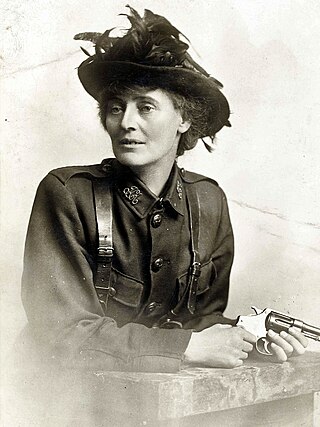
The representation of women in the House of Commons of the United Kingdom has been an issue in the politics of the United Kingdom at numerous points in the 20th and 21st centuries. Originally debate centred on whether women should be allowed to vote and stand for election as Members of Parliament. The Parliament Act 1918 gave women over 21 the right to stand for election as a Member of Parliament. The United Kingdom has had three female Prime Ministers: Margaret Thatcher (1979–1990), Theresa May (2016–2019), and Liz Truss (2022). The publication of the book Women in the House by Elizabeth Vallance in 1979 highlighted the under-representation of women in Parliament. In more modern times concerns about the under-representation of women led the Labour Party to introduce and, decades later, abandon all-women short lists, something which was later held to breach discrimination laws.
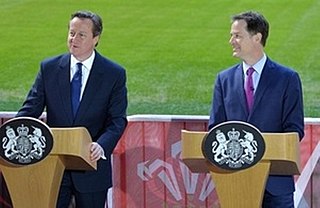
The Cameron–Clegg coalition was formed by David Cameron and Nick Clegg when Cameron was invited by Queen Elizabeth II to form a government, following the resignation of Prime Minister Gordon Brown on 11 May 2010, after the general election on 6 May. It was the UK's first coalition government since the Churchill caretaker ministry in 1945.

Ed Miliband became Leader of the Labour Party and Leader of the Opposition upon being elected to the former post on 25 September 2010. The election was triggered by Gordon Brown's resignation following the party's fall from power at the 2010 general election, which yielded a Conservative–Liberal Democrat Coalition. Miliband appointed his first Shadow Cabinet in October 2010, following the Labour Party Shadow Cabinet elections. These elections were the last such elections before they were abolished in 2011.

The shadow secretary of state for transport is a political post in the United Kingdom. It has been consistently held by a member of the Official Opposition Shadow Cabinet since May 1979. The shadow secretary helps hold the transport secretary and junior ministers to account and is the lead spokesperson on transport matters for their party. Should the relevant party take office, the shadow secretary would be a likely candidate to become the transport secretary.
The shadow cabinet minister for international development is the lead spokesperson for the United Kingdom's Official Opposition on issues related to international aid, most notably to the Third World. The shadow cabinet minister holds the minister of state for development and Africa to account in Parliament. The role previously had no counterpart in the Government between 2020 and 2022 after the Department for International Development (DFID) and the role of international development secretary was abolished by the second Johnson government in 2020. The position was renamed from shadow secretary of state for international development in November 2021 and placed under the shadow foreign secretary.
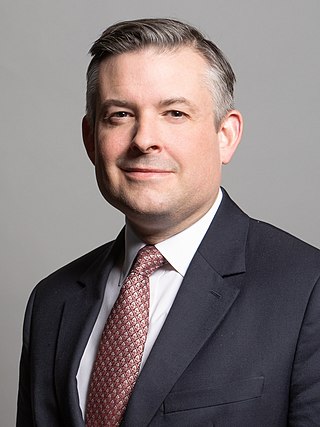
Jonathan Michael Graham Ashworth 14 October 1978) is a British former Labour and Co-op politician who was the Member of Parliament (MP) for Leicester South from 2011 to 2024. He had served as Shadow Paymaster General from September 2023 until unexpectedly losing his seat in the 2024 general election by a slim margin.

John Smith was Leader of the Labour Party and Leader of the Official Opposition from 18 July 1992 until his death on 12 May 1994. Smith became leader upon succeeding Neil Kinnock, who had resigned following the 1992 general election—for the fourth successive time, the Conservatives had won and Labour lost.

Tony Blair was Leader of the Labour Party and Leader of the Opposition from his election as Leader on 21 July 1994 until he became Prime Minister on 2 May 1997. Blair became leader upon the death of John Smith.

Jeremy Corbyn assumed the position of Leader of the Opposition after being elected as leader of the Labour Party on 12 September 2015; the election was triggered by Ed Miliband's resignation following the Labour Party's electoral defeat at the 2015 general election when David Cameron formed a majority Conservative government. The usual number of junior shadow ministers were also appointed.
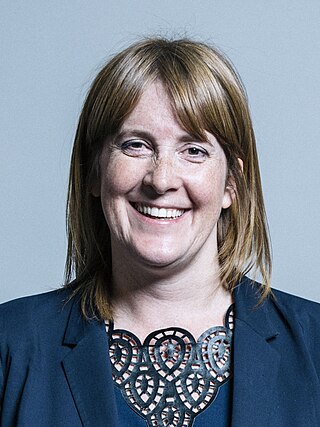
Sarah Ann Jones is a British Labour Party politician who has been Member of Parliament (MP) for Croydon West, formerly Croydon Central, since 2017 and a Minister of State in the Department for Energy Security and Net Zero and the Department for Business and Trade since July 2024.
The frontbench of His Majesty's Loyal Opposition in the Parliament of the United Kingdom consists of the Shadow cabinet and other shadow ministers of the political party currently serving as the Official Opposition. From 2020 to 2024, His Majesty's Loyal Opposition was the Labour Party, and the Leader of the Opposition was Keir Starmer.
































